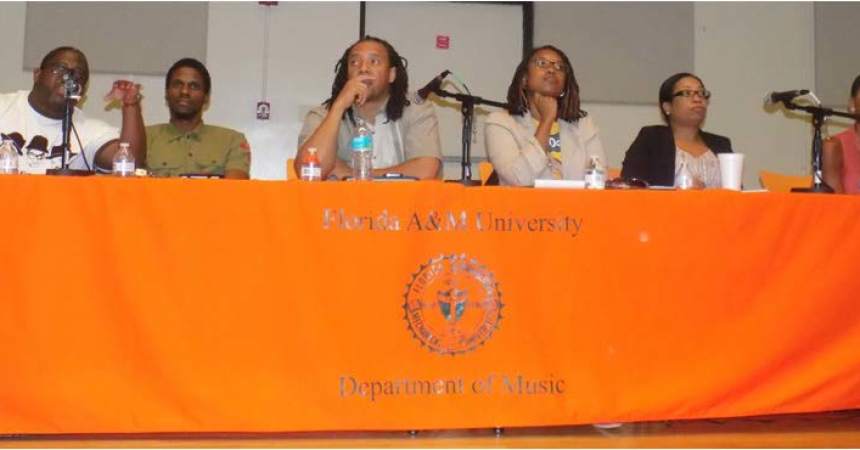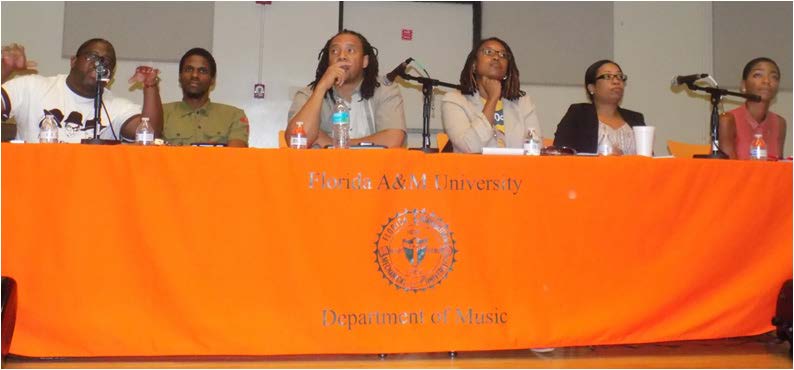
FAMU Staff and Students Critique the “No. 1 Movie in America”

Diaspora dialogue panelists: Kawachi Clemons (left) Honors English,
Spencer Tyrus, Kristal Clemons, Amenah Shakir and Iyelli Ichile.
By Nadia Felder
Outlook Writer
Six panelists had more than 100 Florida A&M University students engaged, more than nearly any other campus-wide event could ever do.
The Hip-Hop Diaspora Dialogue in the Foster Tanner Recital Hall on Aug. 3, was a discussion opened to both faculty and students, which focused on the history of Hip-Hop in regards to the movie “Straight Outta Compton.”
Some students felt as if the movie successfully demonstrated social injustices in the late 80s between the Black community and law enforcement, which coincidently reoccur in today’s society.
Students like 21-year-old Chauncey Stroud, a senior business administration student from Chicago, Ill. and a huge fan of N.W.A., believed that the movie portrayed an inspirational message to speak in confidence and to be fearless through the art of rap music about genuine social issues.
“They (N.W.A.) said stuff that was revolutionary,” said Stroud. “I saw five young Black men who said forget what everybody else wants to talk about, this is what we want to talk about.”
Stroud later said that he did not believe that the movie was just another undermining representation of how the “White man” views Black men, but rather an example of how a group of Black men stood up for what they believed in.
“I’m 21, in college with two internships and I made it,” Stroud stated. “When does the ownership take place on the individual, instead of all Blacks just being a bunch of ‘n—-s with attitudes’?”
While some N.W.A. fans liked the music, other fans thought the movie had a discriminating message.
For instance, one of the panelists, Kristal Clemons, social science education coordinator and former African-American experience professor, said that she liked the movie for bringing back old memories, but did not like the scandalous role that the Black women played in the movie.
“I love the music and the film because it brought back so many memories from my childhood: the box braids, the stone jeans, and the flannel shirts. But I didn’t like the misogyny (sexual objectification of women),” Clemons stated. “As a Black feminist, I critique the misogyny and then I enjoy the art.”
The art from “Straight Outta Compton” involves the musical aspect of realism present in Hip-Hop.
According to the Director of the Institute of Research in Music and Entertainment Studies at FAMU and husband to Kristal Clemons, Kawachi Clemons, the movie mirrored what is going on in the rest of the country.
“I look at Hip-Hop as the conscience response to the social, political and economic issues going on around us,” Kawachi Clemons said.
The panelist later added, from a musical standpoint, that nine times out of 10 if a person doesn’t understand Hip-Hop, it is because it was not meant for them.
“We must remember the words of the jazz pianist Billy Taylor,” Kawachi Clemons said. “The music that is being created speaks to and for the generation that is creating it.”
Although almost all six of the panelists agreed that Hip-Hop was in fact an expression of art in accordance to one’s environment, there was one panelist who thought both Hip-Hop and “Straight Outta Compton” was ruining the Black community.
A history professor by the name Iyelli Ichile strategically waited to the end of the discussion only to say that she disagrees with the majority of what the audience had to say. She made it clear that she was not a feminist and that the core problem with Hip-Hop was White supremacy.
“There is White supremacy in the hood,” stated Ichile. “That’s the whitest part of this country. There is love there. There is African culture there. And there is African consciousness there. But to have an African revolution for African people, women and men must both do it together. Therefore, any kind of N.W.A. idea cannot happen if the sistahs aren’t there.”
With a strong belief in retaliation and fighting for African rights, Ichile said there was nothing revolutionary about the film and N.W.A.’s music.
“Eazy-E wasn’t a gangster!” exclaimed Ichile. “Harriet Tubman was a gangster.”







